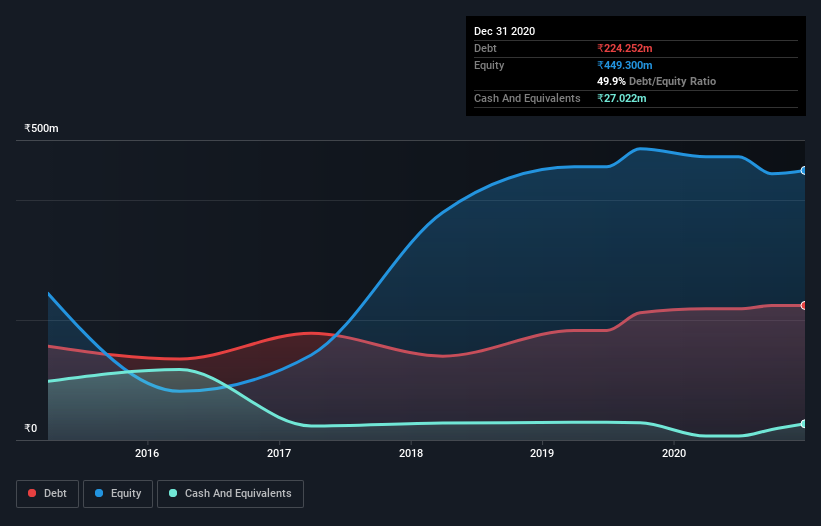Does Total Transport Systems (NSE:TOTAL) Have A Healthy Balance Sheet?
Warren Buffett famously said, 'Volatility is far from synonymous with risk.' So it seems the smart money knows that debt - which is usually involved in bankruptcies - is a very important factor, when you assess how risky a company is. We can see that Total Transport Systems Limited (NSE:TOTAL) does use debt in its business. But is this debt a concern to shareholders?
When Is Debt A Problem?
Debt assists a business until the business has trouble paying it off, either with new capital or with free cash flow. If things get really bad, the lenders can take control of the business. However, a more common (but still painful) scenario is that it has to raise new equity capital at a low price, thus permanently diluting shareholders. Of course, the upside of debt is that it often represents cheap capital, especially when it replaces dilution in a company with the ability to reinvest at high rates of return. The first thing to do when considering how much debt a business uses is to look at its cash and debt together.
Check out our latest analysis for Total Transport Systems
What Is Total Transport Systems's Debt?
The chart below, which you can click on for greater detail, shows that Total Transport Systems had ₹224.3m in debt in December 2020; about the same as the year before. On the flip side, it has ₹27.0m in cash leading to net debt of about ₹197.2m.

How Healthy Is Total Transport Systems' Balance Sheet?
The latest balance sheet data shows that Total Transport Systems had liabilities of ₹484.0m due within a year, and liabilities of ₹35.7m falling due after that. Offsetting this, it had ₹27.0m in cash and ₹822.6m in receivables that were due within 12 months. So it can boast ₹330.0m more liquid assets than total liabilities.
This surplus liquidity suggests that Total Transport Systems' balance sheet could take a hit just as well as Homer Simpson's head can take a punch. With this in mind one could posit that its balance sheet means the company is able to handle some adversity. The balance sheet is clearly the area to focus on when you are analysing debt. But it is Total Transport Systems's earnings that will influence how the balance sheet holds up in the future. So when considering debt, it's definitely worth looking at the earnings trend. Click here for an interactive snapshot.
Over 12 months, Total Transport Systems made a loss at the EBIT level, and saw its revenue drop to ₹3.4b, which is a fall of 4.6%. We would much prefer see growth.
Caveat Emptor
Importantly, Total Transport Systems had an earnings before interest and tax (EBIT) loss over the last year. To be specific the EBIT loss came in at ₹11m. That said, we're impressed with the strong balance sheet liquidity. That should give the business time to grow its cashflow. The company is risky because it will grow into the future to get to profitability and free cash flow. The balance sheet is clearly the area to focus on when you are analysing debt. However, not all investment risk resides within the balance sheet - far from it. We've identified 4 warning signs with Total Transport Systems (at least 3 which are significant) , and understanding them should be part of your investment process.
If you're interested in investing in businesses that can grow profits without the burden of debt, then check out this free list of growing businesses that have net cash on the balance sheet.
If you decide to trade Total Transport Systems, use the lowest-cost* platform that is rated #1 Overall by Barron’s, Interactive Brokers. Trade stocks, options, futures, forex, bonds and funds on 135 markets, all from a single integrated account. Promoted
Valuation is complex, but we're here to simplify it.
Discover if Total Transport Systems might be undervalued or overvalued with our detailed analysis, featuring fair value estimates, potential risks, dividends, insider trades, and its financial condition.
Access Free AnalysisThis article by Simply Wall St is general in nature. It does not constitute a recommendation to buy or sell any stock, and does not take account of your objectives, or your financial situation. We aim to bring you long-term focused analysis driven by fundamental data. Note that our analysis may not factor in the latest price-sensitive company announcements or qualitative material. Simply Wall St has no position in any stocks mentioned.
*Interactive Brokers Rated Lowest Cost Broker by StockBrokers.com Annual Online Review 2020
Have feedback on this article? Concerned about the content? Get in touch with us directly. Alternatively, email editorial-team (at) simplywallst.com.
About NSEI:TOTAL
Total Transport Systems
Provides logistic services in India and internationally.
Solid track record with mediocre balance sheet.
Similar Companies
Market Insights
Community Narratives



